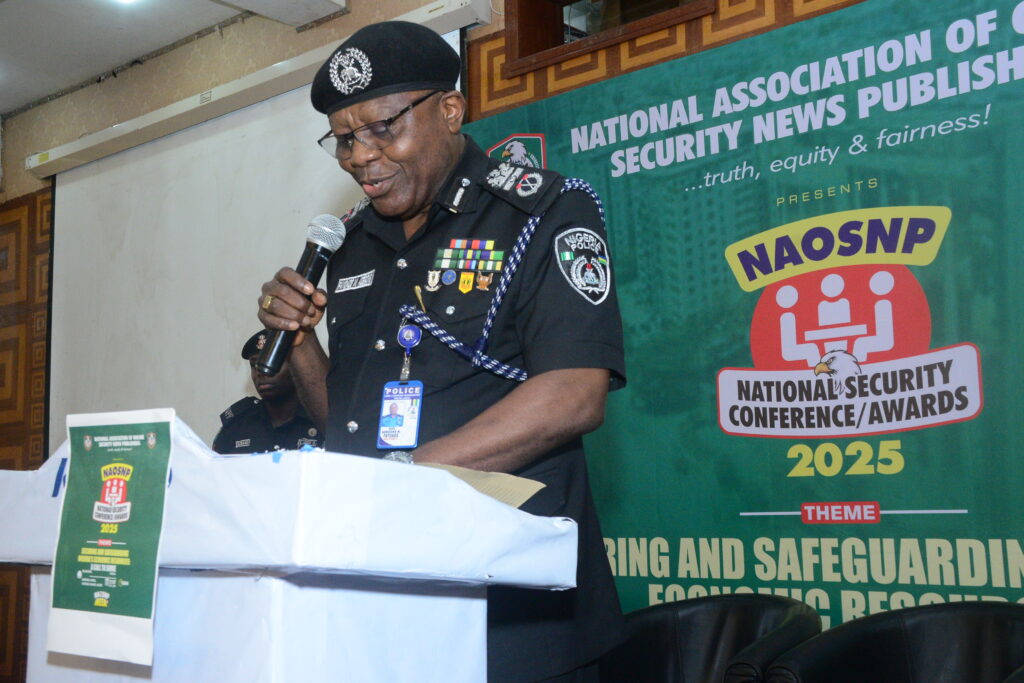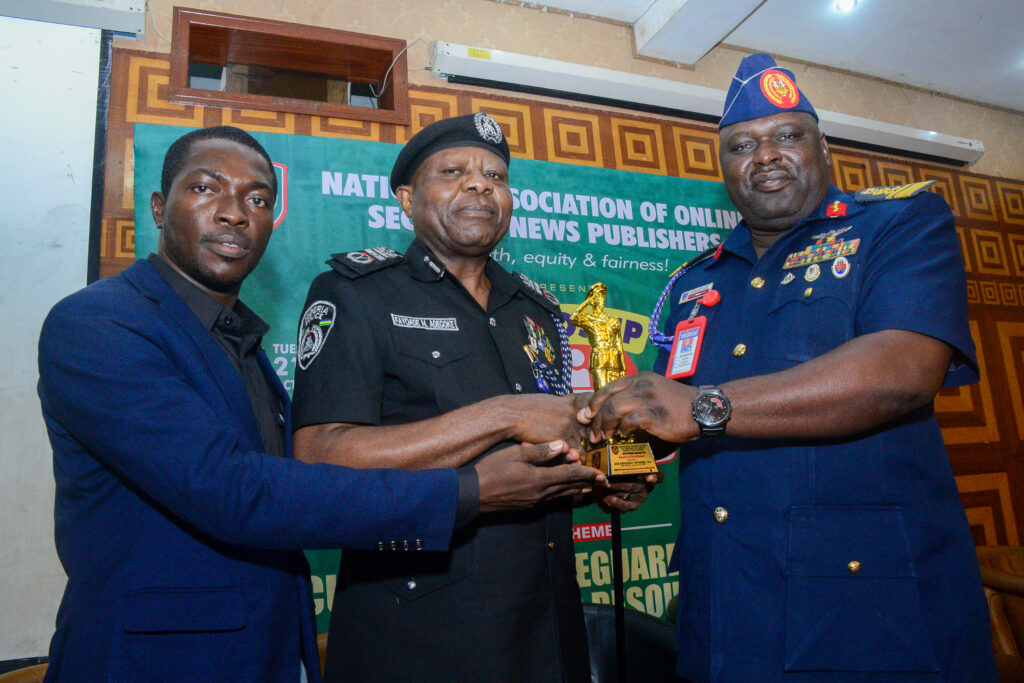SECURING AND SAFEGUARDING NIGERIA’S ECONOMIC RESOURCES: A CALL TO SERVE
By: AIG ADEGOKE FAYOADE

Distinguished guests, esteemed colleagues, and patriotic citizens,
Introduction
The quest to secure and safeguard economic resources lies at the heart of every nation’s struggle for stability, prosperity, and sovereignty.
Globally, the distribution and management of wealth determine not only the quality of governance but also the dignity of citizenship. Economic resources, spanning natural endowments, human capital, and financial assets form the foundation upon which national progress is built.
Yet, despite the abundance of global wealth exceeding $500 trillion, vast inequalities persist, with corruption, weak institutions, and illicit financial flows draining an estimated $1.6 trillion annually from developing economies alone. The real challenge, therefore, is not scarcity, but the capacity to protect, manage, and deploy resources responsibly.
To secure these assets is to safeguard the nation’s future; to serve in this mission is to defend the economic integrity and collective destiny of the people.
Nigeria, Africa’s largest economy and most populous nation, stands at a pivotal crossroads in its developmental trajectory, one defined by the urgent necessity to secure and safeguard its vast economic resources from the persistent threats of mismanagement, corruption, and systemic exploitation.
Endowed with abundant natural wealth of over 37 billion barrels of proven oil reserves, 209 trillion cubic feet of natural gas, and extensive deposits of solid minerals, Nigeria remains ensnared in the paradox of poverty amid plenty.
According to the National Bureau of Statistics (2023), approximately 63% of Nigerians still live in multidimensional poverty, a reflection of the deep structural inefficiencies undermining national prosperity.The problem is not the absence of resources, but rather the chronic failure to protect and prudently manage them.
The Nigerian Extractive Industries Transparency Initiative (NEITI) reported in 2024 that the nation loses an estimated $26.3 billion annually to oil theft, illicit financial flows, and illegal mining activities. Furthermore, between 2009 and 2020, the country lost more than $46 billion to crude oil theft and unremitted funds, resources that could have transformed infrastructure, education, and healthcare. Beyond hydrocarbons, Nigeria’s agricultural and maritime sectors also suffer from systemic sabotage, smuggling, and weak regulatory oversight, bleeding the economy of potential revenue.
This persistent rapid loss of national wealth poses a grave threat to national security, economic sovereignty, and social stability. As a result, safeguarding Nigeria’s economic resources has evolved from a policy concern into a moral and patriotic imperative, one that calls for renewed commitment, institutional integrity, and collective vigilance.
To secure Nigeria’s economic resources is, therefore, not a matter of administrative convenience or mere policy rhetoric. It is a sacred duty – a moral and patriotic obligation. Every citizen, every public servant, and most crucially, every officer of the Nigeria Police Force (NPF) must recognize this task as a solemn call to service.
As the principal law enforcement institution in Nigeria, the NPF bears the overarching mandate of upholding law and order, preventing and investigating crimes, and safeguarding lives and property across the federation.
This responsibility transcends the realm of routine administration; it constitutes a critical component of national security and governance. In this regard, the Force’s role demands a high degree of professionalism, intelligence-led policing, and strategic inter-agency collaboration to effectively combat economic and financial crimes that undermine national stability, weaken institutional integrity, and erode the very foundations of sustainable development.
Conceptualizing Economic Resource Security
At its core, economic resource security entails the deliberate protection of a nation’s productive assets (tangible and intangible) against theft, waste, abuse, and external or internal subversion. It encompasses the protection of oil and gas infrastructure, mineral resources, public finances, digital economies, human capital, and the intellectual property that sustains innovation and competitiveness.
For Nigeria, this concept demands a multidimensional strategy. It means safeguarding the integrity of our fiscal systems, ensuring that oil revenues are not siphoned through illicit financial flows; protecting agricultural supply chains from sabotage; preventing illegal mining and smuggling; and ensuring that every kobo collected in taxes is accounted for.
Within this framework, the NPF occupies a strategic and indispensable position. The Police must evolve beyond traditional crime-fighting into a knowledge-driven, intelligence-led, and digitally equipped force that anticipates and disrupts economic crimes before they metastasize.
This requires synergy with sister agencies such as the Economic and Financial Crimes Commission (EFCC), Independent Corrupt Practices and Other Related Offences Commission (ICPC), Nigeria Security and Civil Defence Corps (NSCDC), Department of State Services (DSS) and the Nigeria Customs Service (NCS); deepened intelligence networks; and a new institutional culture anchored on professionalism, accountability, and ethical integrity.
Nexus Between National Security and Economic Stability
There is a direct, unbreakable correlation between economic security and national stability. When the nation’s wealth is plundered or mismanaged, the consequences reverberate across every sector, rising unemployment, deepening poverty, social unrest, and political fragility. Conversely, where resources are well-managed and safeguarded, stability flourishes, governance thrives, and public confidence deepens.
The NPF, as the frontline institution in internal security, must therefore see economic protection as a pillar of national defense. Every act of pipeline vandalism, every case of illegal mining, every smuggling operation, and every instance of cyber fraud weakens the very fabric of the state. Curbing these ills is not only an economic necessity but an act of strategic patriotism.
However, beyond enforcement, perception matters. A credible and accountable Police Force inspires investor confidence, strengthens institutional legitimacy, and encourages voluntary compliance. When the people believe in the integrity of the Force, they become partners in intelligence sharing, vigilance, and collective protection of the nation’s wealth.
Emerging Threats to Nigeria’s Economic Resources
The threats confronting Nigeria’s economic resources have evolved from simple physical theft to complex, technology-driven and transnational crimes.
Among these are:
Cyber and Financial Crimes: Nigeria loses an estimated ₦127 billion annually to digital fraud and cyber-enabled financial scams. These crimes undermine fiscal stability and public trust in financial institutions.
Oil Theft and Illegal Bunkering: The nation loses over $2 billion yearly to oil theft, a rapid loss that sabotages revenue generation and environmental sustainability.
Illegal Mining and Environmental Degradation: Unauthorized mining operations, particularly in gold-producing regions, have created parallel economies that fund armed groups and fuel insecurity.
Corruption and Institutional Leakages: Weak oversight mechanisms, bureaucratic opacity, and collusive corruption continue to drain public coffers and frustrate developmental planning.
Terrorism, Banditry, and Insurgency: Attacks on farmlands, mining sites, and transport networks disrupt production and distribution, exacerbate inflation, and threaten food security.
These threats are interconnected, reinforcing one another in a vicious cycle. Addressing them demands adaptive policing, one that is preventive rather than reactive, technologically empowered rather than manpower-dependent, and strategically coordinated rather than institutionally isolated.
Strategic Policing for Economic Safeguard
To effectively secure Nigeria’s economic resources, the Police must redefine their operational paradigm from conventional enforcement to developmental security.
This transformation rests on five strategic pillars:
Intelligence-Led Policing: Deploying forensic accounting, digital surveillance, and data analytics to identify, trace, and dismantle economic crime networks.
Inter-Agency Collaboration: Institutionalizing a National Economic Resource Protection Task Force comprising the Police, EFCC, ICPC, NSCDC, Customs, and NFIU to promote intelligence sharing and coordinated responses.
Public-Private Partnerships: Engaging banks, oil corporations, telecommunication firms, and technology start-ups in early-warning systems and risk prevention frameworks.
Ethical Reorientation and Professional Training: Strengthening internal discipline, cultivating integrity, and enhancing officers’ capacity in economic and financial intelligence.
Technology Integration: Utilizing drones, GIS mapping, digital registries, and blockchain auditing to monitor assets, prevent vandalism, and ensure traceability of economic transactions.
Through these strategies, the NPF can reposition themselves as not merely law enforcers but as guardians of national prosperity, a Force that protects wealth as diligently as it protects lives.
A Call to Serve
Ladies and gentlemen, securing Nigeria’s economic resources is more than a strategic necessity, it is a moral covenant. It calls upon every officer of the Nigeria Police Force to see their badge not only as a symbol of authority but as a shield of national stewardship. To serve Nigeria faithfully is to ensure that her natural and financial blessings are not plundered by a few but preserved for all. The moral decay of corruption, complacency, and complicity poses the greatest internal threat to our collective future. The ethical revolution we require begins with us in the choices we make, the accountability we uphold, and the example we set. Economic guardianship must therefore become a core tenet of policing ethos, one rooted in service, sacrifice, and sincerity.
In Conclusion
Securing and safeguarding Nigeria’s economic resources is an act of national preservation, a defense of our sovereignty, our dignity, and our future. The NPF must lead this vanguard through innovation, integrity, and inter-agency synergy. Policymakers must equally support this mission through institutional strengthening, digital transformation, and adequate welfare for security personnel.
The prosperity of our nation is not preordained; it is the outcome of deliberate action, courageous leadership, and moral conviction. Therefore, the time to act is now. Let us rise collectively, as officers, as citizens, as patriots, to ensure that every drop of oil, every ounce of mineral, every tax kobo, and every innovation serves the Nigerian people.
“To serve and protect” must now mean to secure and sustain, to defend not just the people, but the very wealth upon which their future depends. Let this be our creed. Let this be our call to serve.
